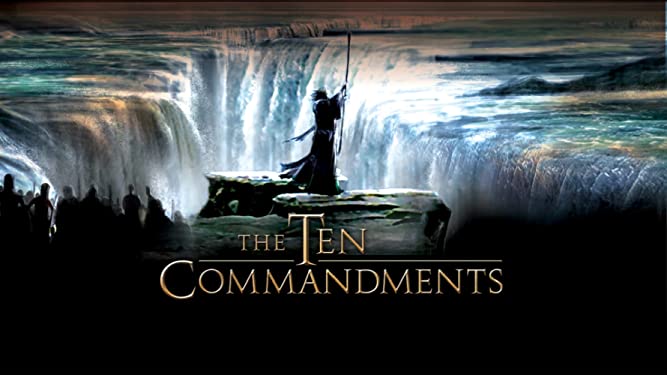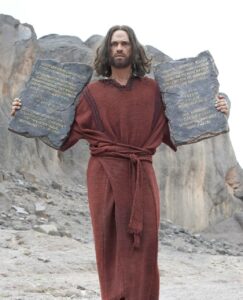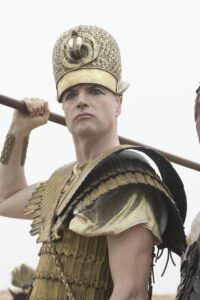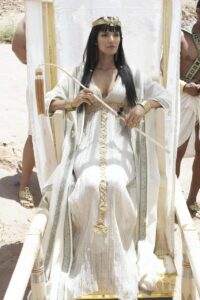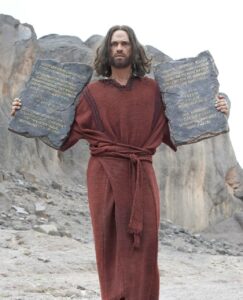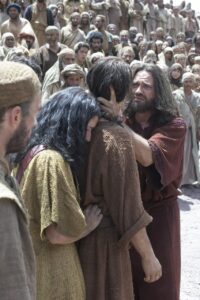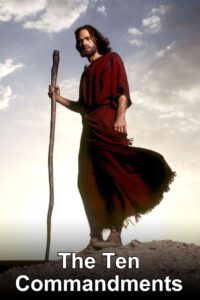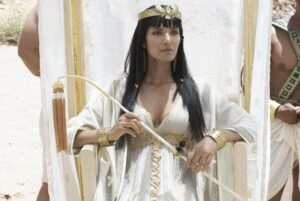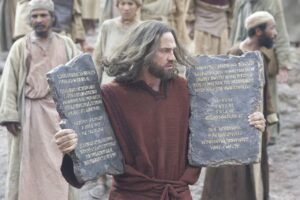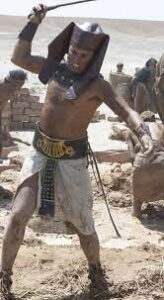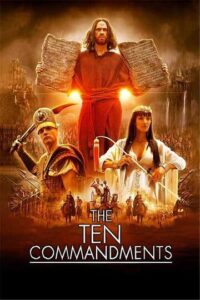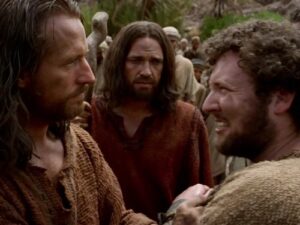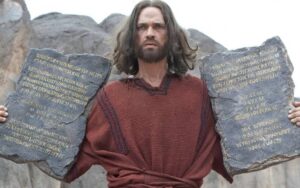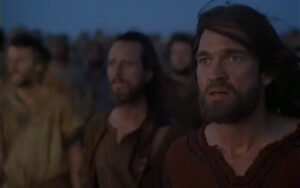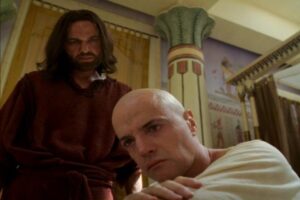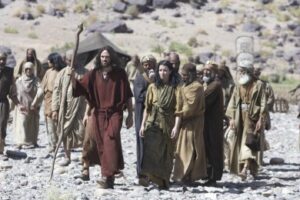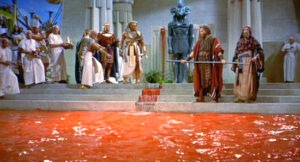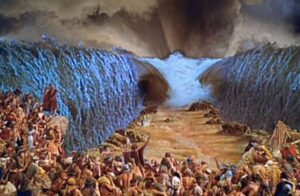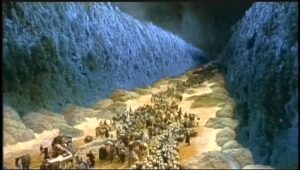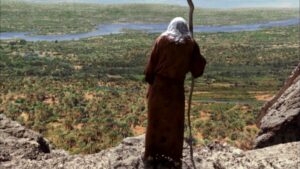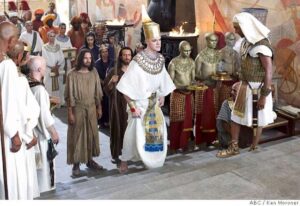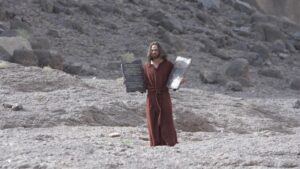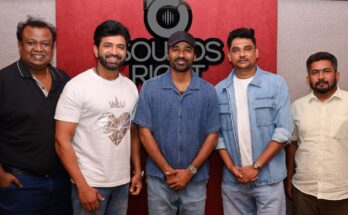The Ten Commandments 2021 English Movie Review
Cast-;
Dougray Scott , Linus Roache ,Naveen Andrews ,Mía Maestro ,Paul Rhys ,Richard O’Brien ,Silas Carson , Padma Lakshmi , Susan Lynch , Claire Bloom , Omar Sharif and others.
Crew-;
Written – Ron Hutchinson , Directe – Robert Dornhelm , Theme music composer – Randy Edelman , Producers – Bernard Dudek*Robert Halmi Sr.Production companies Actuality Productions ,Hallmark Entertainment , Distri buter – HansaPictures , P R O – PentaganPR * Prakash and others .
Story-;
Moses’s mother, Jochebed, saves her baby from the edict of the Pharaoh that all newborn male Hebrew children must die by placing him in a basket on the Nile River. He is found by Pharaoh’s daughter Bithia and adopted into the royal house. Some time later, Bithia gives birth to a son Menerith, and they are raised as brothers. Moses grows up knowing that he is not the blood brother of Menerith, but is shown his true heritage (something he knows nothing about) at about the age of 10: he is re-introduced to Jochebed, his father Amram, his brother Aaron, and his sister Miriam.Years later, Prince Moses and Menerith inspect a building site. While Menerith leaves for a task, Moses continues his inspection only to witness an Egyptian overseer attempting to rape the wife of a Hebrew laborer. Moses manages to rescue the Hebrew couple by killing the Egyptian overseer and hiding the body. When the body is discovered, Pharaoh orders Moses’ arrest, but he is able to escape with the aid of Menerith.
After traveling days through the desert, Moses arrives in Midian and saves the seven daughters of Jethro from tribesmen. In gratitude, their father gives Moses the choice of one of them to take for his wife. He refuses but is later convinced by Zipporah to marry her.Moses, still wanting to know why God allows the Hebrews to be ensl aved, climbs Mount Sinai (Mount Horeb) and is confronted by God in the form of a bush that burns but is not co nsumed. God tells Moses that “I am who I am”, gives Moses his powers, and endows him with the knowledge to free the Hebrews.
Because Pharaoh Ramesses refuses to free the Hebrews, Egypt is struck with ten plagues. Only after the final one, during which Pharaoh’s beloved son dies, are the Hebrews freed. However, Pharaoh’s heart is hardened once more due to him being unable to accept his son’s death, and decides to try to re-capture them.The Hebrews are guided to the Red Sea by a cloud. When the Egyptians’ chariots get near, God blocks their path and Moses parts the Red Sea, providing the Hebrews an escape route. When the Hebrews make it to the other side, Moses closes the separated waters, drowning the pursuing Egyptians — including Menerith. The Hebrews witness Moses weeping over Menerith, whom he later gives a proper burial.’
Moses climbs the mountain to receive God’s commandments in the form of two stone tablets. However, when he descends, he finds that many of the Hebrews have built a golden calf and created an orgy. Moses destroys the tablets and the idol in a fit of rage and orders the deaths of the wicked revelers. After a brutal fight that leaves many dead, the survivors plead to receive God’s commandments and Moses climbs up the mountain again. After Moses reads the commandments, the tablets are placed in an ark.Sometime later, an elderly Moses lives his life as a hermit on a mountain slope and is seen looking at the promised land, which he is not allowed to enter due to an unspecified previous disobedience to God.
Watch The Trailor -;
Movie Review-;
This latest version is quite different from the earlier one. While in Cecil Demille’s version, Moses rises as a pow erful prince and the Pharoah even considers making him a heir to his throne before he gets banished into the de sert, in this version, Moses is shown killing an Egyptian overseer attempting to outrage the modesty of a Hebrew slave and then, fleeing into the desert, fearing punishment. Ask anyone you like to name an Old Testament Bible film and they will always give you the same reply. Cecil B. DeMille’s The Ten Commandments starring Charlton Heston. DeMille’s film (until recently) towered above all other Bible films at the box office, and in the public con sciousness, and still dictates the way the story of Moses is read and imagined two generations later.This isn’t the only place where the story differs from the earlier version. At several points, the new version is quite different from Cecil Demille’s versionWhile the new version might be more accurate in narrating what actually happened, there can be no disputing the fact that Cecil B Demille is clearly the more impressive one and the primary reason for that is the manner in which the story is narrated.
It is in fact 50 years since the release of that film, and as a result someone has decided that it was high time som eone re-visited the subject matter. Of course Moses hasn’t been absent from our screens these last five decades. Straub and Hulliet’s unusual adaptation of Schoenberg’s Moses und Aron broke the deadlock in 1973, and was swiftly followed by Moses (1975) starring Burt Lancaster. Wholly Moses (1980) attempted to do for Moses movi es what Life of Brian did for Jesus films, and the end of the nineties brought two more interpretations. Roger You ng’s lesser known Moses (1996) featured an incredible performance from Ben Kingsley and was one of The Bible Collection’s finest films. Finally, in 1998, Moses was again a popular cinema icon again as Dreamworks produced its animated Prince of Egypt.Firstly, the newer version is devoid of grandeur. It looks like a poorer version of the original ‘Ten Commandments’.Secondly, the original had Elmer Bernstein’s music as one of its pillars. Jason Cam iolo and Randy Edelman’s music for this new version is nowhere close to being as impressive as the music one heard in the original.
So whilst this is far from the first Moses film since Chuck Heston donned his huge white beard, it is the first film since then to dare to call itself The Ten Commandments and take on the multitude of connotations, evocations and comparisons that this title brings with it. And about time too.Early on this film nails it’s colours to the mast. This is going to be a very different version of the life of Moses. Whereas DeMille’s film spent two hours getting to the point where the one time prince is banished from the land in which he grew up, this film gets to that point (just one and a half chapters into the book of Exodus) in 20 minutes. However, even in this short time it has alr eady managed to build in a convincing relationship between Moses and his (fictitious) step brother Menerith. The story slows down a bit once Moses reaches Midian, rescues Jethro’s daughters and marries his eldest. The change of pace highlights a key theme that will emerge in this film. Here we see him adjust from city life to being a nomad in the desert. Later he will lead his people through a similar transition.
Soon enough though Moses encounters God at the burning bush, and reluctantly agrees to do God’s bidding for him in the court of the new pharaoh.Aaron and the Israelite leaders take some convincing; Pharaoh, obviously, needs even more and Egypt is engulfed by the ten plagues (although only seven are present). The plagues have always interested historians and scientists alike, and numerous theories have developed giving natural explan ations for them. Here, as with DeMille’s film, such theories are toyed with. DeMille put them on the lips of the sceptical Ramsees. Here we hear some from the narrator (which brings with it a sense that his is unquestionable and objective), but others are shown and discredited before our eyes. It is an interesting mix, and leaves the view er some scope to consider their own response. The final plague, the death of the first born, has traditionally been given short shrift by Moses films. In DeMille’s first version of The Ten Commandments (1923), Pharaoh’s child is such a brat that the viewer can’t wait for him to be killed off. Recent version have been more sympathetic, the Prince of Egypt stands out in particular, but this film moves things one a stage further.
Not only are we shown an Egyptian (Menerith) who we can sympathise with who loses his beloved son, but there is a strong visual similarity between Ramsees’ son and the early scenes of Moses as a boy. Menerith calls Moses’ god a cruel god, and Moses is unable to argue with him.As this film comes in two parts, it breaks just as the Isra elites are crossing the sea, leaving most of the film for more unexplored territory. As a result we see episodes that are rare for films about Moses; the bitter waters of Marah, the provision of manna and quail to eat, water from the rock, the victory of over the Amalekites and the visit of Jethro. This scene is perhaps the most curious. The way the bible tells this scene, Jethro brings Zipporah and Moses’s sons back to him, and then advises him to delegate out his work load. Here, agonisingly almost, Jethro’s arrival contains no such marital advice, even thoug h it means the breakdown of Moses’s marriage. Instead he advises him to take the opposite course of action and “trust no-one”. It’s a strange variation on the story, and whilst Jethro is later proved right to a degree, such pre-figuring is unnecessary.
Omar Sharif’s wisdom would have been better dispensed along traditional lines.Thirdly, the story in the newer version is told in a great hurry as they seek to cover most of the events that happened in Moses’s life. However, for those who have already watched Cecil B DeMille’s version, this kind of gets annoying. One tends to get the feeling that importan details while narrating landmark developments in Moses’ life have been given a miss.This apart, only a few actors come up with convincing performances. Dougray Scott takes time to settle into the role of Moses but after a while, is convincing and comes up with a neat performance. Naveen Andrews as Menerith is impressive as is Omar Sharif as Jethro.Paul Rhys as Ramses is initially impressive but one tends to feel sorry for him as he’s got a very limited role to play in the film.It is this second half of the film that one gets the impression that the film makers really care about. Whilst the first half of the film is tightly wound so that it fits in as much as possible, the second half of the film is allowed to roam around new territory much like its subjects.
New sub-plots are imported to give more of a sense of the challenges Moses faced in working this group of for mer slaves into a new nation. Some of these are more successful than others. When two of the Israelites commit adultery, and then try to cover it up with murder and perjury, the need for some sort of moral framework is nice ly highlighted. On the other hand, the scenes of the Israelites developing an army to take on the Amalekites feel a little too reminiscient of Spartacus and Gladiator.However, it is this emphasis on the need for Israel to trans ition from a group of slaves to a nation, which distinguishes this film from the other Moses movies. Most tend to focus on Moses initial successes, even though he actually led the Israelites for more than a generation, his acc omplishments were far more than being the man who held a stick over the sea whilst God peeled back its wate rs.On of the other things that this film considers is the development of monotheism. The realisation gradually begins to dawn on Moses that there is only one god, and that he is God of the whole world. There are many facets of this development .
Moses first hearing about the Israelite God, encountering him at the burning bush, and his subsequent meditati on on his name. Later on Moses notes that God is travelling with them outside of Egypt and his recollection of th e story of monotheistic pharaoh Akhnaten brings things to a head. What is strange is the way that the film emp hasises this aspect whilst also purging the story of its Jewish roots.Perhaps the biggest strength of this film, ho wever, is the way it handles the difficult parts of the bible, and stares unflinchingly form the parts that today see m unpalatable. The most striking aspect of this is the character of Moses himself, who is deliberately played uns ympathetically at times. When he is told as a child that he needs to master his temper, we expect this only to ap ply as far as his murder of the Egyptian, and are surprised when it continues unchecked. After his violent res cue of Zipporah and her sisters, he recognises that he has acted out of anger and how foolish that was. His confront ations with his fellow Israelites are frequently angry, and he holds some resentment towards the God he serves yet struggles to understand, throughout the film.
Dougray Scott’s portrayal is a far cry from Charlton Heston’s noble prince turned sinless prophet. Yet there is, perhaps more biblical warrant for this occasionally petulant version of Moses than Heston’s. When Heston tries to shrug off God’s call, it seems more like modesty than anything else – the biblical Moses takes far more convincing, and is still arguing the toss three chapters later (Ex 6:12). Every time the people moan to him, he moans to God, even asking to die at one point (Num 11:10-15). The biblical Moses’s anger continues throughout the story, causing him to smash the tablets of stone, and ultimately exclude himself from the promised land.But the film is also unwilling to downplay the uncomfortable nature of other biblical episodes. After Moses returns from the top of Sinai it is he and his followers that kill everyone who continues worshipping the Golden Calf, rat her than an act of God. Such parts of the bible should make us feel uncomfortable, and challenge our unde rsta nding of the bible. It is when bible films do this that they really prove their worth.The film does have it’s weakne sses. Dougray Scott’s wig is far more distracting than any piece of costume deserves to be.
Some of the actors chosen for the lesser parts (such as David Schneider and Richard O’Brien for British viewers) are so fixed by their previous roles as to make it hard to take them seriously. And a scene where Moses tries to caj ole Joshua out of his apparently naive pacifism should have been left on the cutting room floor.But, overall for a TV film it does so much right as well. There is plenty of interesting camerawork. When a defeated Ramsees finally agrees to release the Israelites, the low angled camera makes Moses appear to tower over him (right). The re are a number of God shots, allowing the viewer to see things from his point of view from time to time.Best of all it handles the biblical text in a way that manages to be both faithful enough to appease those seeking a very literal adaptation, whilst also presenting it in a way that is fresh and challenging.To even consider remaking a cla ssic like ‘The Ten Commandments’ requires great ourage and one has to give directors Jason Camiolo and Randy Edelman credit for it. However, one cannot but admit that this version is a sad attempt at narrating the story of Moses.
This IS MY Personal Review So Please Go And Watch The Movie In Theaters Only
Written By- T.H.PRASAD -B4U-Ratting – 5 /5
